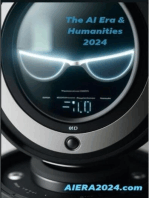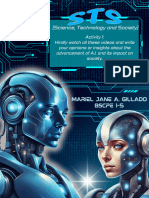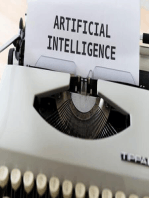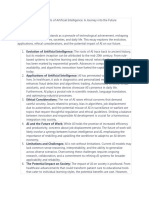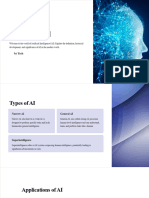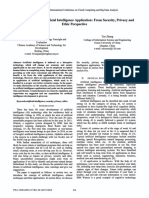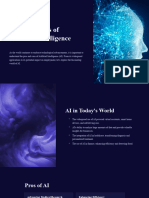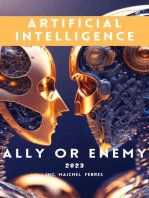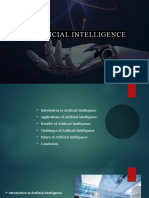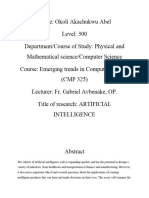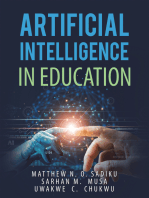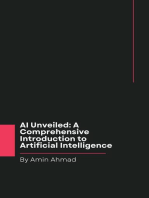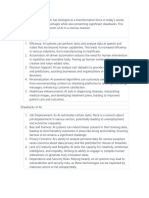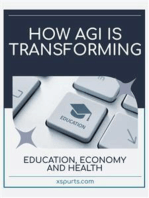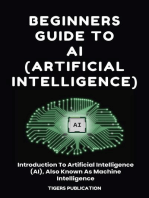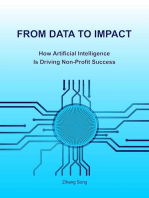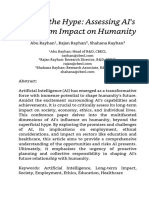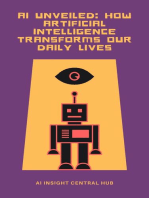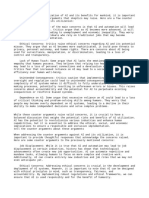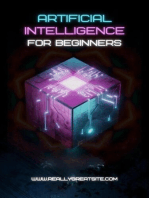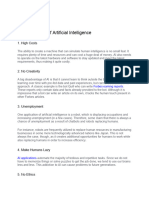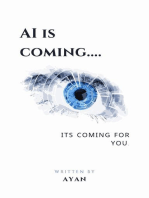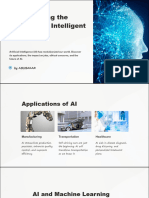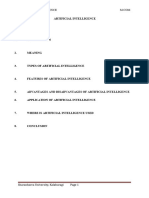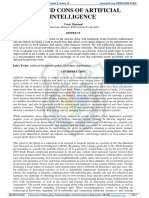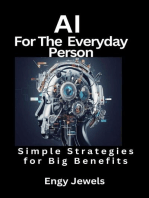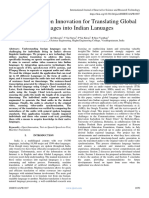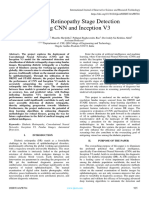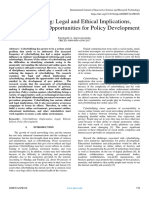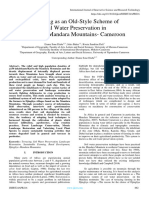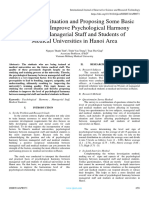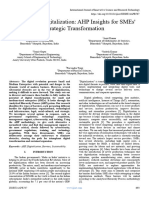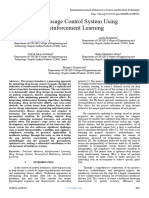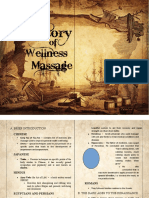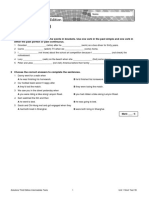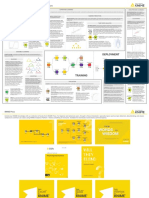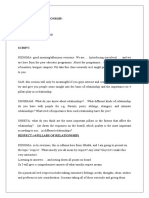Professional Documents
Culture Documents
AI Mini Research Project On Loss of Natural Intelligence in Humans Due To AI
Original Title
Copyright
Available Formats
Share this document
Did you find this document useful?
Is this content inappropriate?
Report this DocumentCopyright:
Available Formats
AI Mini Research Project On Loss of Natural Intelligence in Humans Due To AI
Copyright:
Available Formats
Volume 8, Issue 4, April 2023 International Journal of Innovative Science and Research Technology
ISSN No:-2456-2165
AI Mini Research Project on Loss of Natural
Intelligence in Humans due to AI
AKARSH JAIN (20212005)
SWAPNIL NAWANI (20212059)
Abstract:- Experts are still debating the potential Some AI systems' lack of transparency and explainability
negative effects of AI on natural human intelligence. raises concerns about accountability and human oversight,
Some argue that relying on AI for certain tasks may lead which may contribute to a loss of trust in human
to a decrease in critical thinking and decision-making intelligence and decision-making.
abilities in humans, as well as job and skill loss. There The use of AI in education raises concerns about its
are also concerns about the potential biases and errors impact on natural human intelligence, including the
that AI systems may introduce, which could perpetuate possibility of limiting creativity and critical thinking
existing inequalities and erode human intelligence. abilities. Because of the rapid pace of technological
Others, however, believe that AI has the potential to advancement in AI, there may be unanticipated
improve human intelligence and augment human consequences on natural human intelligence that we are
capabilities in a variety of fields, including healthcare not yet aware of.
and education. It is critical to carefully consider the It is critical to consider the potential ethical implications
potential risks and benefits of AI, as well as to devise of AI and its impact on natural human intelligence,
strategies for mitigating any negative effects on natural including the possibility of privacy and human rights
human beings. Ongoing research, regulation, and ethical violations.
considerations are necessary to ensure that AI is The incorporation of AI into healthcare raises concerns
developed and used in ways that promote human well- about its impact on natural human intelligence,
being and intelligence. particularly the possibility of it replacing human empathy
and emotional intelligence in patient care.
I. INTRODUCTION
II. HISTORY OF AI
In recent years, artificial intelligence (AI) has
advanced rapidly and is increasingly being integrated into The history of human-AI interaction can be traced
various aspects of modern life. While artificial intelligence back to the early days of computing in the mid-20th century.
has the potential to provide numerous benefits, such as Chess was one of the first applications of AI, with early
increased efficiency and accuracy in tasks, there are computer programmes designed to compete against human
concerns about the potential negative effects on natural opponents.
human intelligence. Decision-making, problem-solving, and
language processing are all tasks that AI systems are In 1997, IBM's Deep Blue computer famously
designed to perform. As a result, there are concerns that defeated world chess champion Garry Kasparov, marking a
humans will become overly reliant on AI, losing important watershed moment in AI development. AI has advanced in
cognitive skills such as critical thinking and decision- areas such as natural language processing, image
making, as well as important social and emotional skills. recognition, and decision-making over the years.
This could have serious societal consequences, such as job
displacement and a widening of the skills gap.In this These advancements have resulted in the development
context, it is important to carefully consider the potential of intelligent machines capable of performing tasks that
risks and benefits of AI and to develop strategies for were previously thought to be the sole domain of human
mitigating any negative impacts on natural human intelligence.
intelligence.
One of the main concerns about AI is that it has the Some experts believe that AI has the potential to
potential to perpetuate existing biases and inequalities. improve human intelligence and augment human
This has the potential to erode natural human intelligence capabilities, while others are concerned about the potential
while also reinforcing negative stereotypes and negative effects of AI on natural human intelligence, such as
discrimination. job displacement, loss of critical thinking skills, and the
perpetuation of biases and inequalities.
Another source of concern is the possibility of AI
replacing human workers in certain industries, resulting in As artificial intelligence (AI) continues to advance and
job displacement and economic inequality. There is also become more integrated into various aspects of modern life,
the possibility that AI systems will be hacked or it is critical to carefully consider the potential risks and
manipulated, resulting in unintended consequences and benefits, as well as to develop responsible approaches to its
negative effects on natural human intelligence. development and use, in order to promote the enhancement
and protection of natural human intelligence.
IJISRT23APR671 www.ijisrt.com 742
Volume 8, Issue 4, April 2023 International Journal of Innovative Science and Research Technology
ISSN No:-2456-2165
III. NEGATIVE EFFECTS OF AI ON HUMANS B. Weaknesses:
● AI may be lacking in creativity and the ability to think
While AI has the potential to improve human outside the box.
intelligence and capabilities, there are a number of negative ● Humans may become overly reliant on AI, resulting in a
effects of AI on humans that must be considered. Among the decline in natural intelligence.
negative consequences are: ● AI may be limited in its decision-making abilities, and it
● Job displacement: AI has the potential to automate tasks may not always make ethical or moral decisions.
that were previously performed by humans, resulting in ● AI necessitates maintenance and repair, which can be
job displacement and economic inequality. expensive and time-consuming.
● Loss of critical thinking skills: Overreliance on AI can ● Data bias: AI can be biassed by the data on which it is
lead to a loss of critical thinking skills, which are required trained, resulting in incorrect or unfair decision-making.
for making complex decisions and problem solving.
● Bias perpetuation: AI systems have the potential to C. Opportunities:
perpetuate existing biases and inequalities, eroding natural ● AI can improve efficiency and productivity in a variety
human intelligence and reinforcing negative stereotypes of industries, resulting in cost savings and increased
and discrimination. profits.
● AI lacks empathy and emotional intelligence, which are ● New products and services: AI can enable the
required for human-to-human interactions. development of previously impossible new products and
● Concerns about privacy: AI can collect and use personal services.
data in ways that are intrusive and infringe on privacy ● Medical advancements: AI can lead to advancements in
rights. medical research and treatment, improving health
● Cybersecurity risks: AI systems are susceptible to outcomes for patients.
cyberattacks and hacking, which can have unintended ● Improved safety: AI can improve safety in many
consequences and have a negative impact on human industries, such as transportation and manufacturing.
intelligence.
● Artificial intelligence (AI) can limit human creativity and D. Threats:
innovation in creative fields such as music and art. ● Job displacement: Artificial intelligence (AI) may
● Overreliance on technology: Overreliance on AI can result replace human jobs, resulting in unemployment and
in a lack of self-reliance and independence, which can economic disruption.
have a negative impact on human intelligence and well- ● Data breaches and cyber attacks are two examples of
being. privacy and security risks posed by AI.
● Unintended consequences: Because AI systems are ● Concerns about ethics: AI raises ethical concerns about
complex, there may be unintended consequences that have decision-making, bias, and responsibility.
a negative impact on human intelligence and society as a ● Lack of control: As AI becomes more advanced and
whole. autonomous, humans may lose control.
● Ethical concerns: The development and use of AI raise ● AI can be vulnerable to adversarial attacks, in which it is
significant ethical concerns, such as transparency, intentionally manipulated to produce incorrect results.
accountability, and fairness, which require careful
consideration and regulation to ensure that they do not V. RESEARCH GAP
negatively impact human intelligence and well-being. Increase of Human dependence on Artificial
Intelligence
IV. SWOT ANALYSIS OF AI OVER HUMANS
VI. RESEARCH OBJECTIVE
A. Strengths:
● Speed and efficiency: AI can process and analyse To assess the performance of AI and Natural
massive amounts of data at a rate far exceeding that of Intelligence
humans.
● Precision and accuracy: AI can perform tasks with high VII. RESEARCH METHODOLOGY
accuracy and precision, reducing errors and increasing
productivity. Research Question: What effect does artificial
● Repetitive tasks: AI can perform repetitive tasks intelligence have on human natural intelligence?
indefinitely without becoming tired or bored. AI can The research design will be a quantitative study with
learn and adapt to new situations and environments, data collected via a survey questionnaire. The survey
improving its performance over time. questionnaire will be designed to assess respondents'
● Automation: AI can automate previously manual tasks, perceptions of AI and its impact on their natural
freeing up time for more complex or creative work. intelligence.
Participants: The participants will be adults aged 18 and
up from all over the world. A statistical power analysis
will be used to determine sample size in order to ensure
that the study has enough statistical power to detect
significant differences.
IJISRT23APR671 www.ijisrt.com 743
Volume 8, Issue 4, April 2023 International Journal of Innovative Science and Research Technology
ISSN No:-2456-2165
Data Collection: An online survey questionnaire will be Bostrom, N., & Yudkowsky, E. (2018). The ethics
used to collect data, which will be distributed via email, of artificial intelligence. In Artificial intelligence safety
social media, and online forums. The survey questionnaire and security (pp. 57-69). Chapman and Hall/CRC.
will include questions about the respondents'
demographics. The essay "Will Artificial Intelligence (AI) Overpower
Data Analysis: The collected data will be analysed using Human Intelligence (HI)?" by Garg, Punia, and Punia
descriptive statistics to summarise the demographics, (2019). "A Glimpse of Future Business and Education"
experiences, opinions, and perceived level of natural investigates the impact on business and education. They
intelligence of the respondents. Thematic analysis will be also mention the possible downsides of AI, such as job
used to identify common themes and patterns in displacement and the possibility of AI outperforming
qualitative data collected from open-ended questions. human intelligence in certain disciplines. There are
Ethical Considerations: The study will adhere to the potential concerns, and policies and regulations must be
ethical standards established by the institutional review devised to ensure that AI is developed and used
board (IRB) and will protect the participants' responsibly and ethically.
confidentiality and anonymity. All participants will be
Garg, M., Punia, V., & Punia, B. K. Will Artificial
asked to provide informed consent before being included
Intelligence (AI) Overpower Human Intelligence (HI)? A
in the study.
Peep into Future Business and Education.
VIII. LITERATURE REVIEW
Spector and Ma's (2019) article "Inquiry and Critical
A. FINAL INDEPENDENT VARIABLE Thinking Skills for the Next Generation." While AI has
Ml the potential to transform many parts of education, the
Reinforcement learning authors suggest that it is also necessary to keep a focus
Deep learning on fostering human intelligence abilities such as critical
Critical Decison making thinking, problem-solving, and teamwork. The essay
Critical thinking underlines the need of cultivating inquiry-based learning
Creativity and critical thinking abilities in the next generation, as
Human safety well as the need to keep an emphasis on growing human
Job displacement intelligence skills alongside the increasing role of AI in
Ethical considerations education.
Control over AI
Spector, J.M., Ma, S. Inquiry and critical thinking
B. FINAL DEPENDENT VARIABLE skills for the next generation: from artificial intelligence
Natural Intelligence back to human intelligence. Smart Learn. Environ. 6, 8
(2019). https://doi.org/10.1186/s40561-019-0088-z
C. Literature Review
The article "Stifling artificial intelligence: Human perils" The paper "Will Artificial Intelligence Surpass Human
by Gurkaynak, Yilmaz, and Haksever (2016) explores Intelligence?" by Fang, Su, and Xiao (2018) addresses
the potential benefits and risks associated with the the potential for artificial intelligence (AI) to surpass
development and widespread use of artificial intelligence human intelligence in the future. The authors then
(AI). While AI has the potential to transform many examine the possibility of AI continuing to progress and
industries and make our lives easier, it also poses serious possibly surpassing human intellect in other areas, such
hazards to human safety, privacy, and autonomy. The as decision-making and creativity. While super
authors cite various concerns linked with AI, including intelligent AI has the potential to provide enormous
employment displacement, bias and discrimination, and benefits, such as enhanced decision-making and the
the possibility for AI systems to be manipulated for ability to tackle complicated issues, it also has the
malicious reasons. Overall, the study emphasizes the potential to pose major risks, such as AI acting against
importance of careful assessment and regulation of AI as human interests or making judgments that are difficult to
it continues to grow. understand or manage.
Gurkaynak, G., Yilmaz, I., & Haksever, G. Fang, J., Su, H., & Xiao, Y. (2018). Will Artificial
(2016). Stifling artificial intelligence: Human perils. Intelligence Surpass Human Intelligence?. Available at
Computer Law & Security Review, 32(5), 749-758. SSRN 3173876.
Bostrom and Yudkowsky's (2018) chapter "The Ethics of The authors claim that, while AI has made great progress
Artificial Intelligence" delves into the ethical in recent years, it still falls short in many areas, such as
considerations surrounding AI, such as how to ensure creativity, emotional intelligence, and adaptability, when
that AI systems are aligned with human values, how to compared to human intelligence. BI has the ability to
avoid unintended consequences, and how to ensure that supplement and enhance AI in order to create more
AI is developed and used responsibly, emphasizing the human-like intelligent systems.
importance of transparency and accountability in AI
development. Constraints include the brain's complexity and the
necessity for interdisciplinary teamwork Lu, H., Li, Y.,
IJISRT23APR671 www.ijisrt.com 744
Volume 8, Issue 4, April 2023 International Journal of Innovative Science and Research Technology
ISSN No:-2456-2165
Chen, M., Kim, H., & Serikawa, S. (2018). Brain Carlsmith, J. (2022). Is Power-Seeking AI an
intelligence: go beyond artificial intelligence. Mobile Existential Risk?. arXiv preprint arXiv:2206.13353.
Networks and Applications, 23, 368-375.
It is critical to put human needs and preferences at the
The essay "The Risks of Artificial Intelligence to forefront of AI development and implementation. The
Security and the Future of Work" by Osoba and Welser study discusses the ethical challenges associated with the
(2017) analyzes the potential concerns in the fields of development and deployment of AI systems, such as
security and the future of work. Possibility of harmful bias, privacy, and transparency.Vishwarupe, V.,
usage by state and non-state entities, as well as job Maheshwari, S., Deshmukh, A., Mhaisalkar, S., Joshi, P.
displacement and economic disruption. The authors M., & Mathias, N. (2022). Bringing Humans at the
emphasize the significance of creating risk-management Epicenter of Artificial Intelligence: A Confluence of AI,
measures for AI, such as initiatives to encourage HCI and Human Centered Computing. Procedia
transparency, accountability, and responsible usage of AI Computer Science, 204, 914-921.
technologies. Grace et al. (2018) provide the findings of an AI expert
poll to forecast when artificial intelligence systems will
Osoba, O.A., & Welser, W. (2017). The Risks of outperform humans in certain tasks. The authors hope to
Artificial Intelligence to Security and the Future of bridge the gap between public perception of AI and
Work. Perspective, RAND Corporation: PE-237-RC. expert viewpoints in the subject. The findings indicate
DOI: 10.7249/PE237 that experts predict AI systems will exceed humans in all
of these categories within the next several decades, with
The essay "Inquiry and Critical Thinking Skills for the speech recognition being the first area where AI will
Next Generation: From Artificial Intelligence Back to outperform humans.
Human Intelligence" by Spector and Ma (2019)
highlights the relevance of inquiry and critical thinking Grace, K., Salvatier, J., Dafoe, A., Zhang, B., &
skills. According to the authors, these abilities are critical Evans, O. (2018). When will AI exceed human
for establishing a thorough understanding of AI performance? Evidence from AI experts. Journal of
technologies and their potential impact, as well as Artificial Intelligence Research, 62, 729-754.
supporting ethical AI use and development.
During the game, the AI system employed a
The importance of inquiry and critical thinking reinforcement learning method to learn from its
abilities in preparing the next generation for the successes and mistakes. According to the authors, this
challenges and opportunities given by AI is discussed in study shows that AI has the ability to outperform humans
this article. in difficult decision-making tasks, which has crucial
implications for future improvements in AI technology
Humans and AI must collaborate to develop techniques and applications. They also emphasize the importance of
for encouraging inquiry and critical thinking abilities in ongoing research and debate on the ethical consequences
the context of AI, as well as addressing the ethical and of AI surpassing human skills in numerous sectors.
societal consequences of these technologies.
Blair, A., & Saffidine, A. (2019). AI surpasses
Spector, J. M., & Ma, S. (2019). Inquiry and humans at six-player poker. Science, 365(6456), 864-
critical thinking skills for the next generation: from 865.
artificial intelligence back to human intelligence. Smart
Learning Environments, 6(1), 1-11. The authors examined the performance of humans and
AI agents on a cognitive test battery that comprised
Using artificial intelligence to "hack" human decision- activities such as analogical reasoning, logical reasoning,
making and behavior. The book delves into numerous and visual perception, among others. The study
scenarios in which artificial intelligence (AI) could be discovered that the AI agents performed significantly
used to "hack" human decision-making, such as targeted better than the human participants.
advertising, social media manipulation, and other forms
of psychological manipulation. Insa-Cabrera, J., Dowe, D. L., Espana-Cubillo, S.,
Hernández-Lloreda, M. V., & Hernández-Orallo, J.
Lexcellent, C. (2019). Artificial Intelligence Versus (2011). Comparing humans and AI agents. In Artificial
Human Intelligence: Are Humans Going to Be Hacked?. General Intelligence: 4th International Conference, AGI
Springer. 2011, Mountain View, CA, USA, August 3-6, 2011.
Proceedings 4 (pp. 122-132). Springer Berlin
Carlsmith's (2022) work, "Is Power-Seeking AI an Heidelberg.
Existential Risk?" addresses the idea that artificially Jeff Heaton's book "Artificial Intelligence for Humans,
intelligent systems with a power-seeking goal may Volume 3: Deep Learning and Neural Networks"
represent an existential threat to humanity. AI poses a introduces deep learning and neural networks with a
greater threat to humanity than other forms of AI. focus on practical applications. The author discusses
deep learning principles and approaches such as
feedforward neural networks, convolutional neural
IJISRT23APR671 www.ijisrt.com 745
Volume 8, Issue 4, April 2023 International Journal of Innovative Science and Research Technology
ISSN No:-2456-2165
networks, and recurrent neural networks. Unsupervised to ensure that AI is in line with human values and used to
learning, reinforcement learning, and natural language benefit society. They conclude that while AI has the
processing are also covered in the book. potential to be a transformative technology, careful
consideration and prudent development are required to
Heaton, J. (2015). Artificial intelligence for maximize its benefits while minimizing its risks.
humans, volume 3: Deep learning and neural networks. Nowak, A., Lukowicz, P., & Horodecki, P. (2018).
by Heaton Research, Inc.. Assessing artificial intelligence for humanity: Will AI be
the our biggest ever advance? Or the biggest threat
Potential risks include job loss, privacy problems, and [Opinion]. IEEE Technology and Society Magazine,
the prospect of AI systems having goals that are 37(4), 26-34
incompatible with human values. They argue that a
human-centered approach to AI development is required
IX. DATA ANALYSIS
SAMPLE SIZE - 80 RESPONSES
AGE GROUP OF SAMPLE - 20 TO 65 YEARS
Fig. 1: AI has a negative impact on natural intelligence of Humans
Fig. 2: Dependent are you on AI in personal or professional life
Fig. 3: AI can affect cognitive function in humans
IJISRT23APR671 www.ijisrt.com 746
Volume 8, Issue 4, April 2023 International Journal of Innovative Science and Research Technology
ISSN No:-2456-2165
Fig. 4: AI can affect creativity in humans
Fig. 5: AI can affect thinking in humans
Fig. 6: Critical thinking skills in your personal or professional life
Fig. 7: Human safety in the development and use of AI
IJISRT23APR671 www.ijisrt.com 747
Volume 8, Issue 4, April 2023 International Journal of Innovative Science and Research Technology
ISSN No:-2456-2165
Fig. 8: AI will replace your job
Fig. 9: Ethics are important for AI
Fig. 10: Deep Learning and Machine learning can help to solve AL problems
Fig. 11: Humans should have control over AI
IJISRT23APR671 www.ijisrt.com 748
Volume 8, Issue 4, April 2023 International Journal of Innovative Science and Research Technology
ISSN No:-2456-2165
Fig. 12: Makes better decisions: Humans or AI
Fig. 13: AI and Humans can work together
X. FUTURE STUDY REFERENCES
We need to explore the areas where AI can’t [1.] Gurkaynak, G., Yilmaz, I., & Haksever, G. (2016).
overpower humans and natural intelligence is above Stifling artificial intelligence: Human perils.
artificial intelligence. Computer Law & Security Review, 32(5), 749-758.
[2.] Bostrom, N., & Yudkowsky, E. (2018). The ethics of
XI. CONCLUSION artificial intelligence. In Artificial intelligence safety
and security (pp. 57-69). Chapman and Hall/CRC.
While AI is capable of performing certain tasks more [3.] Garg, M., Punia, V., & Punia, B. K. Will Artificial
efficiently than humans, such as data processing and Intelligence (AI) Overpower Human Intelligence
analysis, human intelligence remains superior in many areas. (HI)? A Peep into Future Business and Education.
Humans, for example, have emotional intelligence and [4.] Spector, J.M., Ma, S. Inquiry and critical thinking
creativity that are currently beyond the capabilities of AI. skills for the next generation: from artificial
Furthermore, AI technology development is not a zero-sum intelligence back to human intelligence. Smart Learn.
game in which AI gains must necessarily come at the Environ. 6, 8 (2019). https://doi.org/10.1186/s40561-
expense of human intelligence. Rather, the two can coexist 019-0088-z
and complement each other, with AI performing tasks better [5.] Fang, J., Su, H., & Xiao, Y. (2018). Will Artificial
suited to machines and humans concentrating on areas Intelligence Surpass Human Intelligence?. Available
where our unique abilities are most valuable. Overall, the at SSRN 3173876.
advancement of AI is unlikely to result in a loss of natural [6.] Lu, H., Li, Y., Chen, M., Kim, H., & Serikawa, S.
intelligence in humans. Instead, we should focus on (2018). Brain intelligence: go beyond artificial
harnessing the potential of AI to augment our own abilities intelligence. Mobile Networks and Applications, 23,
and create a better future for all. 368-375.
IJISRT23APR671 www.ijisrt.com 749
Volume 8, Issue 4, April 2023 International Journal of Innovative Science and Research Technology
ISSN No:-2456-2165
[7.] Osoba, O.A., & Welser, W. (2017). The Risks of
Artificial Intelligence to Security and the Future of
Work. Perspective, RAND Corporation: PE-237-RC.
DOI: 10.7249/PE237
[8.] Spector, J. M., & Ma, S. (2019). Inquiry and critical
thinking skills for the next generation: from artificial
intelligence back to human intelligence. Smart
Learning Environments, 6(1), 1-11.
[9.] Lexcellent, C. (2019). Artificial Intelligence Versus
Human Intelligence: Are Humans Going to Be
Hacked?. Springer.
[10.] Carlsmith, J. (2022). Is Power-Seeking AI an
Existential Risk?. arXiv preprint arXiv:2206.13353.
[11.] Vishwarupe, V., Maheshwari, S., Deshmukh, A.,
Mhaisalkar, S., Joshi, P. M., & Mathias, N. (2022).
Bringing Humans at the Epicenter of Artificial
Intelligence: A Confluence of AI, HCI and Human
Centered Computing. Procedia Computer Science,
204, 914-921.
[12.] Grace, K., Salvatier, J., Dafoe, A., Zhang, B., &
Evans, O. (2018). When will AI exceed human
performance? Evidence from AI experts. Journal of
Artificial Intelligence Research, 62, 729-754.
[13.] Blair, A., & Saffidine, A. (2019). AI surpasses
humans at six-player poker. Science, 365(6456), 864-
865.
[14.] Insa-Cabrera, J., Dowe, D. L., Espana-Cubillo, S.,
Hernández-Lloreda, M. V., & Hernández-Orallo, J.
(2011). Comparing humans and AI agents. In
Artificial General Intelligence: 4th International
Conference, AGI 2011, Mountain View, CA, USA,
August 3-6, 2011. Proceedings 4 (pp. 122-132).
Springer Berlin Heidelberg.
[15.] Heaton, J. (2015). Artificial intelligence for humans,
volume 3: Deep learning and neural networks. by
Heaton Research, Inc..
[16.] Nowak, A., Lukowicz, P., & Horodecki, P. (2018).
Assessing artificial intelligence for humanity: Will AI
be the our biggest ever advance? Or the biggest threat
[Opinion]. IEEE Technology and Society Magazine,
37(4), 26-34.
ANNEXURE
Untitled form (Responses)
https://docs.google.com/forms/d/1dCffd7bFfkNM_z2Os0wh
R1GJgN9bPttzBsnO7vZcQ9Q/edit
IJISRT23APR671 www.ijisrt.com 750
Volume 8, Issue 4, April 2023 International Journal of Innovative Science and Research Technology
ISSN No:-2456-2165
IJISRT23APR671 www.ijisrt.com 751
Volume 8, Issue 4, April 2023 International Journal of Innovative Science and Research Technology
ISSN No:-2456-2165
IJISRT23APR671 www.ijisrt.com 752
Volume 8, Issue 4, April 2023 International Journal of Innovative Science and Research Technology
ISSN No:-2456-2165
IJISRT23APR671 www.ijisrt.com 753
You might also like
- Activity 1 (STS) - Gillado, Mariel Jane A.Document2 pagesActivity 1 (STS) - Gillado, Mariel Jane A.alvrzmjNo ratings yet
- Harmonizing Humanity and Technology: The Power of AI IntegrationFrom EverandHarmonizing Humanity and Technology: The Power of AI IntegrationNo ratings yet
- Can AI Take Over The Worl1Document14 pagesCan AI Take Over The Worl1Kartik AggarwalNo ratings yet
- Presetation SlideDocument9 pagesPresetation Slideikifty271No ratings yet
- Artificial Intelligence (AI) in Society: The Dual Impact of ProgressFrom EverandArtificial Intelligence (AI) in Society: The Dual Impact of ProgressNo ratings yet
- Title Unveiling The Marvels of Artificial Intelligence A Journey Into The FutureDocument2 pagesTitle Unveiling The Marvels of Artificial Intelligence A Journey Into The FutureAriba ShabbirNo ratings yet
- Evolution of AIDocument12 pagesEvolution of AIpranavsapkale45No ratings yet
- An Exploration On Artificial Intelligence Application: From Security, Privacy and Ethic PerspectiveDocument5 pagesAn Exploration On Artificial Intelligence Application: From Security, Privacy and Ethic PerspectiveDavid SilveraNo ratings yet
- AI Revolutio SSDD NDocument3 pagesAI Revolutio SSDD NSamuel Ivan NganNo ratings yet
- Informe InglesDocument11 pagesInforme Inglesnicolás fantaNo ratings yet
- Pros and Cons of Artificial IntelligenceDocument8 pagesPros and Cons of Artificial Intelligenceprilo4342No ratings yet
- Impact of AI in Today's World: A Systematic ReviewDocument5 pagesImpact of AI in Today's World: A Systematic ReviewInternational Journal of Innovative Science and Research TechnologyNo ratings yet
- Abstract Artificial Intelligence Otherwise Known As AIDocument11 pagesAbstract Artificial Intelligence Otherwise Known As AIRanaNo ratings yet
- Artificial Intelligence Argumentative EssayDocument3 pagesArtificial Intelligence Argumentative EssayPrincess DelimaNo ratings yet
- The Power of Artificial IntelligenceDocument2 pagesThe Power of Artificial IntelligenceSamuel Ivan NganNo ratings yet
- Introduction to AI: Applications, Benefits, Challenges & FutureDocument8 pagesIntroduction to AI: Applications, Benefits, Challenges & FutureIbrahim AymanNo ratings yet
- 325 ResearchDocument11 pages325 Researchakachukwuokoli6No ratings yet
- AI Unveiled: A Comprehensive Introduction to Artificial IntelligenceFrom EverandAI Unveiled: A Comprehensive Introduction to Artificial IntelligenceNo ratings yet
- Artificial Intelligence Is Soooooo FakeDocument4 pagesArtificial Intelligence Is Soooooo FakeDancanNo ratings yet
- Artificial IntelligenceDocument2 pagesArtificial IntelligenceWen MeiNo ratings yet
- Artificial IntelligenceDocument3 pagesArtificial IntelligenceRabia punjaniNo ratings yet
- Evolution of AiDocument3 pagesEvolution of AiromohacNo ratings yet
- High School English 3Document3 pagesHigh School English 3samuelmarvelous32No ratings yet
- Beginners Guide To AI (Artificial Intelligence): Introduction To Artificial Intelligence (AI), Also Known As Machine IntelligenceFrom EverandBeginners Guide To AI (Artificial Intelligence): Introduction To Artificial Intelligence (AI), Also Known As Machine IntelligenceNo ratings yet
- From Data to Impact : How Artificial Intelligent is Driving Non-Profit SuccessFrom EverandFrom Data to Impact : How Artificial Intelligent is Driving Non-Profit SuccessNo ratings yet
- paper on AIDocument2 pagespaper on AI238 Syam BabuNo ratings yet
- Beyond The Hype - Assessing AI's Long-Term Impact On HumanityDocument12 pagesBeyond The Hype - Assessing AI's Long-Term Impact On HumanityAbu RayhanNo ratings yet
- AI Unveiled: How Artificial Intelligence Transforms Our Daily LivesFrom EverandAI Unveiled: How Artificial Intelligence Transforms Our Daily LivesNo ratings yet
- Artificial Intelligence Will Not Make Human Unemployed in The FutureDocument8 pagesArtificial Intelligence Will Not Make Human Unemployed in The FutureHiền HàNo ratings yet
- Deployment of Artificial IntelligenceDocument4 pagesDeployment of Artificial Intelligencesobiarani948No ratings yet
- ExpoundDocument13 pagesExpoundsinghvibhavyNo ratings yet
- The AI Revolution: How Artificial Intelligence Is Reshaping Our Society For Better or WorseDocument4 pagesThe AI Revolution: How Artificial Intelligence Is Reshaping Our Society For Better or Worses2020804No ratings yet
- AI and Its UseDocument2 pagesAI and Its UseWarrior-TankiNo ratings yet
- Group Discussion TopicDocument4 pagesGroup Discussion TopicFitha FathimaNo ratings yet
- Ai ExplanationDocument2 pagesAi ExplanationGAGANDEEP SINGHNo ratings yet
- AI Table Content Outline Refutes Job Loss ClaimsDocument8 pagesAI Table Content Outline Refutes Job Loss ClaimsHiền HàNo ratings yet
- Artificial Intelligence GDDocument3 pagesArtificial Intelligence GDAbhishek KotwalNo ratings yet
- A Study On Artificial Intelligence: International Research Journal of Engineering and Technology (IRJET)Document6 pagesA Study On Artificial Intelligence: International Research Journal of Engineering and Technology (IRJET)Ambika BNo ratings yet
- Raising Objections To The Integration of AIDocument10 pagesRaising Objections To The Integration of AInichtsaltaluneNo ratings yet
- Artificial IntelligenceDocument8 pagesArtificial IntelligenceMAKAR S.No ratings yet
- Essay On Artificial IntelligenceDocument3 pagesEssay On Artificial Intelligenceayeshanoor1354No ratings yet
- Report-0.44538000 1710681155Document3 pagesReport-0.44538000 1710681155Amisha KhannaNo ratings yet
- The Sentient AI Revolution: How Artificial Intelligence Gained Consciousness and What It Means for HumanityFrom EverandThe Sentient AI Revolution: How Artificial Intelligence Gained Consciousness and What It Means for HumanityNo ratings yet
- Artificial IntelligenceDocument5 pagesArtificial IntelligenceGechelle MakiputinNo ratings yet
- A Debate On AIDocument6 pagesA Debate On AInyarkopatricia32No ratings yet
- AIChat GPTDocument12 pagesAIChat GPTSajid khanNo ratings yet
- Artificial IntelligenceDocument3 pagesArtificial IntelligenceIshfaq AhmadNo ratings yet
- AI: Unlocking The Potential of Intelligent Machines: by AbubakarDocument10 pagesAI: Unlocking The Potential of Intelligent Machines: by AbubakarabubakrogNo ratings yet
- Artificial IntelligenceDocument21 pagesArtificial Intelligenceshreestationery2016No ratings yet
- JETIR1701631Document6 pagesJETIR1701631shysnicker001No ratings yet
- What Is Artificial IntelligenceDocument14 pagesWhat Is Artificial IntelligenceBeanka PaulNo ratings yet
- An Analysis on Mental Health Issues among IndividualsDocument6 pagesAn Analysis on Mental Health Issues among IndividualsInternational Journal of Innovative Science and Research TechnologyNo ratings yet
- Harnessing Open Innovation for Translating Global Languages into Indian LanuagesDocument7 pagesHarnessing Open Innovation for Translating Global Languages into Indian LanuagesInternational Journal of Innovative Science and Research TechnologyNo ratings yet
- Diabetic Retinopathy Stage Detection Using CNN and Inception V3Document9 pagesDiabetic Retinopathy Stage Detection Using CNN and Inception V3International Journal of Innovative Science and Research TechnologyNo ratings yet
- Investigating Factors Influencing Employee Absenteeism: A Case Study of Secondary Schools in MuscatDocument16 pagesInvestigating Factors Influencing Employee Absenteeism: A Case Study of Secondary Schools in MuscatInternational Journal of Innovative Science and Research TechnologyNo ratings yet
- Exploring the Molecular Docking Interactions between the Polyherbal Formulation Ibadhychooranam and Human Aldose Reductase Enzyme as a Novel Approach for Investigating its Potential Efficacy in Management of CataractDocument7 pagesExploring the Molecular Docking Interactions between the Polyherbal Formulation Ibadhychooranam and Human Aldose Reductase Enzyme as a Novel Approach for Investigating its Potential Efficacy in Management of CataractInternational Journal of Innovative Science and Research TechnologyNo ratings yet
- The Making of Object Recognition Eyeglasses for the Visually Impaired using Image AIDocument6 pagesThe Making of Object Recognition Eyeglasses for the Visually Impaired using Image AIInternational Journal of Innovative Science and Research TechnologyNo ratings yet
- The Relationship between Teacher Reflective Practice and Students Engagement in the Public Elementary SchoolDocument31 pagesThe Relationship between Teacher Reflective Practice and Students Engagement in the Public Elementary SchoolInternational Journal of Innovative Science and Research TechnologyNo ratings yet
- Dense Wavelength Division Multiplexing (DWDM) in IT Networks: A Leap Beyond Synchronous Digital Hierarchy (SDH)Document2 pagesDense Wavelength Division Multiplexing (DWDM) in IT Networks: A Leap Beyond Synchronous Digital Hierarchy (SDH)International Journal of Innovative Science and Research TechnologyNo ratings yet
- Comparatively Design and Analyze Elevated Rectangular Water Reservoir with and without Bracing for Different Stagging HeightDocument4 pagesComparatively Design and Analyze Elevated Rectangular Water Reservoir with and without Bracing for Different Stagging HeightInternational Journal of Innovative Science and Research TechnologyNo ratings yet
- The Impact of Digital Marketing Dimensions on Customer SatisfactionDocument6 pagesThe Impact of Digital Marketing Dimensions on Customer SatisfactionInternational Journal of Innovative Science and Research TechnologyNo ratings yet
- Electro-Optics Properties of Intact Cocoa Beans based on Near Infrared TechnologyDocument7 pagesElectro-Optics Properties of Intact Cocoa Beans based on Near Infrared TechnologyInternational Journal of Innovative Science and Research TechnologyNo ratings yet
- Formulation and Evaluation of Poly Herbal Body ScrubDocument6 pagesFormulation and Evaluation of Poly Herbal Body ScrubInternational Journal of Innovative Science and Research TechnologyNo ratings yet
- Advancing Healthcare Predictions: Harnessing Machine Learning for Accurate Health Index PrognosisDocument8 pagesAdvancing Healthcare Predictions: Harnessing Machine Learning for Accurate Health Index PrognosisInternational Journal of Innovative Science and Research TechnologyNo ratings yet
- The Utilization of Date Palm (Phoenix dactylifera) Leaf Fiber as a Main Component in Making an Improvised Water FilterDocument11 pagesThe Utilization of Date Palm (Phoenix dactylifera) Leaf Fiber as a Main Component in Making an Improvised Water FilterInternational Journal of Innovative Science and Research TechnologyNo ratings yet
- Cyberbullying: Legal and Ethical Implications, Challenges and Opportunities for Policy DevelopmentDocument7 pagesCyberbullying: Legal and Ethical Implications, Challenges and Opportunities for Policy DevelopmentInternational Journal of Innovative Science and Research TechnologyNo ratings yet
- Auto Encoder Driven Hybrid Pipelines for Image Deblurring using NAFNETDocument6 pagesAuto Encoder Driven Hybrid Pipelines for Image Deblurring using NAFNETInternational Journal of Innovative Science and Research TechnologyNo ratings yet
- Terracing as an Old-Style Scheme of Soil Water Preservation in Djingliya-Mandara Mountains- CameroonDocument14 pagesTerracing as an Old-Style Scheme of Soil Water Preservation in Djingliya-Mandara Mountains- CameroonInternational Journal of Innovative Science and Research TechnologyNo ratings yet
- A Survey of the Plastic Waste used in Paving BlocksDocument4 pagesA Survey of the Plastic Waste used in Paving BlocksInternational Journal of Innovative Science and Research TechnologyNo ratings yet
- Hepatic Portovenous Gas in a Young MaleDocument2 pagesHepatic Portovenous Gas in a Young MaleInternational Journal of Innovative Science and Research TechnologyNo ratings yet
- Design, Development and Evaluation of Methi-Shikakai Herbal ShampooDocument8 pagesDesign, Development and Evaluation of Methi-Shikakai Herbal ShampooInternational Journal of Innovative Science and Research Technology100% (3)
- Explorning the Role of Machine Learning in Enhancing Cloud SecurityDocument5 pagesExplorning the Role of Machine Learning in Enhancing Cloud SecurityInternational Journal of Innovative Science and Research TechnologyNo ratings yet
- A Review: Pink Eye Outbreak in IndiaDocument3 pagesA Review: Pink Eye Outbreak in IndiaInternational Journal of Innovative Science and Research TechnologyNo ratings yet
- Automatic Power Factor ControllerDocument4 pagesAutomatic Power Factor ControllerInternational Journal of Innovative Science and Research TechnologyNo ratings yet
- Review of Biomechanics in Footwear Design and Development: An Exploration of Key Concepts and InnovationsDocument5 pagesReview of Biomechanics in Footwear Design and Development: An Exploration of Key Concepts and InnovationsInternational Journal of Innovative Science and Research TechnologyNo ratings yet
- Mobile Distractions among Adolescents: Impact on Learning in the Aftermath of COVID-19 in IndiaDocument2 pagesMobile Distractions among Adolescents: Impact on Learning in the Aftermath of COVID-19 in IndiaInternational Journal of Innovative Science and Research TechnologyNo ratings yet
- Studying the Situation and Proposing Some Basic Solutions to Improve Psychological Harmony Between Managerial Staff and Students of Medical Universities in Hanoi AreaDocument5 pagesStudying the Situation and Proposing Some Basic Solutions to Improve Psychological Harmony Between Managerial Staff and Students of Medical Universities in Hanoi AreaInternational Journal of Innovative Science and Research TechnologyNo ratings yet
- Navigating Digitalization: AHP Insights for SMEs' Strategic TransformationDocument11 pagesNavigating Digitalization: AHP Insights for SMEs' Strategic TransformationInternational Journal of Innovative Science and Research Technology100% (1)
- Drug Dosage Control System Using Reinforcement LearningDocument8 pagesDrug Dosage Control System Using Reinforcement LearningInternational Journal of Innovative Science and Research TechnologyNo ratings yet
- The Effect of Time Variables as Predictors of Senior Secondary School Students' Mathematical Performance Department of Mathematics Education Freetown PolytechnicDocument7 pagesThe Effect of Time Variables as Predictors of Senior Secondary School Students' Mathematical Performance Department of Mathematics Education Freetown PolytechnicInternational Journal of Innovative Science and Research TechnologyNo ratings yet
- Formation of New Technology in Automated Highway System in Peripheral HighwayDocument6 pagesFormation of New Technology in Automated Highway System in Peripheral HighwayInternational Journal of Innovative Science and Research TechnologyNo ratings yet
- TLE BookletDocument4 pagesTLE BookletJulluis DagoNo ratings yet
- Unit 1 Short Test 1B: GrammarDocument2 pagesUnit 1 Short Test 1B: GrammarTanya KolinkovskaNo ratings yet
- Marking of ExaminationDocument1 pageMarking of ExaminationShefat PhiriNo ratings yet
- Gender and Career ChoiceDocument23 pagesGender and Career ChoiceWinny Shiru MachiraNo ratings yet
- Week I - The Human Person in Their EnvironmentDocument5 pagesWeek I - The Human Person in Their EnvironmentClaire E JoeNo ratings yet
- Campus Drive - Zieta Tech. Pvt. Ltd. NoticeDocument1 pageCampus Drive - Zieta Tech. Pvt. Ltd. NoticeBhabani GuddyNo ratings yet
- Benefits of multilingualism in foreign language learningDocument15 pagesBenefits of multilingualism in foreign language learningSuncicaNo ratings yet
- Deployment: Cheat Sheet: Machine Learning With KNIME Analytics PlatformDocument2 pagesDeployment: Cheat Sheet: Machine Learning With KNIME Analytics PlatformIzan IzwanNo ratings yet
- 03 Goal-Use Analysis Worksheet-V2.0 (Excel)Document8 pages03 Goal-Use Analysis Worksheet-V2.0 (Excel)Alfredo FloresNo ratings yet
- Services Marketing - A Practical Approach - Unit 6 - Week 4Document5 pagesServices Marketing - A Practical Approach - Unit 6 - Week 4Sapna RaiNo ratings yet
- Headlong Origins Pack ExampleDocument5 pagesHeadlong Origins Pack ExampleSound WavesNo ratings yet
- Wmsu Tos TemplateDocument29 pagesWmsu Tos TemplateHappy SasotaNo ratings yet
- Employment ReportDocument27 pagesEmployment ReportShivaspaceTechnologyNo ratings yet
- Filipino ChemistDocument2 pagesFilipino ChemistcutefeiNo ratings yet
- 4 Pillars of Strong RelationshipsDocument12 pages4 Pillars of Strong Relationshipsridhima100% (1)
- Education Sector Profile of UgandaDocument29 pagesEducation Sector Profile of Ugandaybbvvprasada raoNo ratings yet
- Bahasa Inggris (Iklan Pekerjaan)Document5 pagesBahasa Inggris (Iklan Pekerjaan)AndreNo ratings yet
- CaragaDocument48 pagesCaragaLovely Grace Bondad LontocNo ratings yet
- IATF Internal Auditor 2019Document1 pageIATF Internal Auditor 2019Prakash kumarTripathiNo ratings yet
- Directories FMDS Comprehensive Exam Date Schedule Second Sem (AY 16 17)Document3 pagesDirectories FMDS Comprehensive Exam Date Schedule Second Sem (AY 16 17)mrrrkkkNo ratings yet
- DR Arun Raj GR. Short CVDocument3 pagesDR Arun Raj GR. Short CVarunraj26No ratings yet
- Sjs Learning Module: Saint Joseph SchoolDocument58 pagesSjs Learning Module: Saint Joseph SchoolChristian Luis De GuzmanNo ratings yet
- Annual Learning Plan (ALP) GuideDocument5 pagesAnnual Learning Plan (ALP) GuideEsteban CarvalloNo ratings yet
- National Policy On EducationDocument9 pagesNational Policy On Educationapi-247249589No ratings yet
- 4th Periodical in MAPEH 5Document5 pages4th Periodical in MAPEH 5Airma Ross Hernandez100% (1)
- PMP Exam Prep Training BrochureDocument10 pagesPMP Exam Prep Training BrochureHarendra kumarNo ratings yet
- Test Za 5 OddDocument3 pagesTest Za 5 OddJasmina Kostadinovska100% (3)
- University of Mumbai No. UG/157 of 2012-13: RD THDocument2 pagesUniversity of Mumbai No. UG/157 of 2012-13: RD THSunil RawatNo ratings yet
- Best Beginner Guitar Books for KidsDocument3 pagesBest Beginner Guitar Books for Kidstvis MusicNo ratings yet
- Reflective Writing - PoetryDocument20 pagesReflective Writing - PoetryPhion MulcareNo ratings yet
